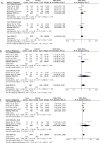Association between angiotensin-converting enzyme (ACE) gene I/D polymorphism with the risk of knee OA: A systematic review, meta-analysis, and meta-regression
- PMID: 38779312
- PMCID: PMC11109534
- DOI: 10.12688/f1000research.140233.1
Association between angiotensin-converting enzyme (ACE) gene I/D polymorphism with the risk of knee OA: A systematic review, meta-analysis, and meta-regression
Abstract
Background: Previous studies have linked genetics to knee osteoarthritis. Angiotensin-converting enzyme (ACE) gene I/D polymorphism may cause OA. However, evidence remains inconsistent. This study examines knee OA risk and ACE gene I/D polymorphism.
Methods: We explored Europe PMC, Medline, Scopus, and Cochrane Library using keywords. Three assessment bias factors were assessed using the Newcastle-Ottawa Scale (NOS). Criteria for inclusion: (1) Split the study population into knee OA patients and healthy controls; (2) Analysed the ACE gene I/D polymorphism; (3) Case-control or cross-sectional surveys. Studies with non-knee OA, incomplete data, and no full-text were excluded. The odds ratio (OR) and 95% confidence intervals (95% CI) were calculated using random-effect models.
Results: A total of 6 case-control studies consist of 1,226 patients with knee OA and 1,145 healthy subjects as controls were included. Our pooled analysis revealed that a significant association between ACE gene I/D polymorphism and risk of knee OA was only seen in the dominant (DD + ID vs. II) [OR 1.69 (95% CI 1.14 - 2.50), p = 0.009, I2 = 72%], and ID vs. II [OR 1.37 (95% CI 1.01- 1.86), p = 0.04, I2 = 43%] genotype models. Other genotype models, including recessive (DD vs. ID + II), alleles (D vs. I), DD vs. ID, and DD vs. II models did not show a significant association with knee OA risk. Further regression analysis revealed that ethnicity and sex may influence those relationships in several genotype models.
Conclusions: Dominant and ID vs. II ACE gene I/D polymorphism models increased knee OA risk significantly. More research with larger samples and different ethnic groups is needed to confirm our findings. After ethnicity subgroup analysis, some genetic models in our study showed significant heterogeneities, and most studies are from Asian countries with Asian populations, with little evidence on Arabs.
Keywords: ACE; genetic models; knee; osteoarthritis; polymorphism.
Copyright: © 2024 Mustari MN et al.
Conflict of interest statement
No competing interests were disclosed.
Figures



References
Publication types
MeSH terms
Substances
Associated data
LinkOut - more resources
Full Text Sources
Miscellaneous

